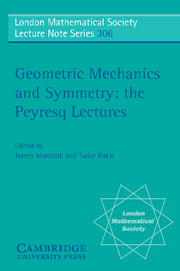Book contents
- Frontmatter
- Contents
- List of contributors
- Preface
- I Stability in Hamiltonian Systems: Applications to the restricted three-body problem (K.R. Meyer)
- II A Crash Course in Geometric Mechanics (T.S. Ratiu)
- III The Euler-Poincaré variational framework for modeling fluid dynamics (D.D. Holm)
- IV No polar coordinates (R.H. Cushman)
- V Survey on dissipative KAM theory including quasi-periodic bifurcation theory (H. Broer)
- VI Symmetric Hamiltonian Bifurcations (J.A. Montaldi)
I - Stability in Hamiltonian Systems: Applications to the restricted three-body problem (K.R. Meyer)
Published online by Cambridge University Press: 19 October 2009
- Frontmatter
- Contents
- List of contributors
- Preface
- I Stability in Hamiltonian Systems: Applications to the restricted three-body problem (K.R. Meyer)
- II A Crash Course in Geometric Mechanics (T.S. Ratiu)
- III The Euler-Poincaré variational framework for modeling fluid dynamics (D.D. Holm)
- IV No polar coordinates (R.H. Cushman)
- V Survey on dissipative KAM theory including quasi-periodic bifurcation theory (H. Broer)
- VI Symmetric Hamiltonian Bifurcations (J.A. Montaldi)
Summary
Introduction
As participants in the MASIE-project, we attended the summer school Mechanics and Symmetry in Peyresq, France, during the first two weeks of September 2000. These lecture notes are based on the notes we took there from Professor Meyer's lecture series “N-Body Problems”.
The N-body problem is a famous classical problem. It consists in describing the motion of N planets that interact with a gravitational force. Already in 1772, Euler described the three-body problem in his effort to study the motion of the moon. In 1836 Jacobi brought forward an even more specific part of the three body problem, namely that in which one of the planets has a very small mass. This system is the topic of this paper and is nowadays called the restricted three-body problem. It is a conservative system with two degrees of freedom, which gained extensive study in mechanics.
The N-body problem has always been a major topic in mathematics and physics. In 1858, Dirichlet claimed to have found a general method to treat any problem in mechanics. In particular, he said to have proven the stability of the planetary system. This statement is still questionable because he passed away without leaving any proof. Nevertheless, it initiated Weierstrass and his students Kovalevski and Mittag-Leffler to try and rediscover the method mentioned by Dirichlet.
- Type
- Chapter
- Information
- Geometric Mechanics and SymmetryThe Peyresq Lectures, pp. 1 - 22Publisher: Cambridge University PressPrint publication year: 2005
- 2
- Cited by



